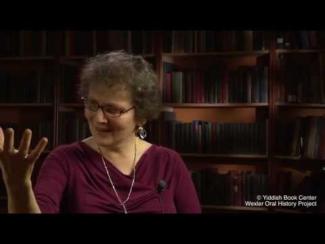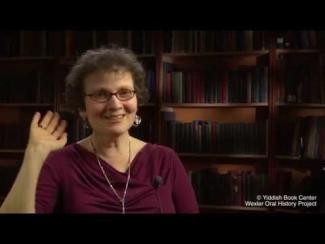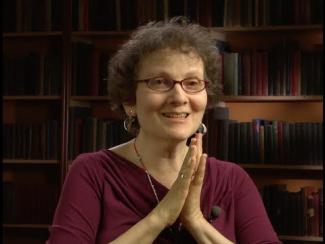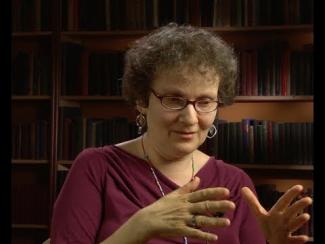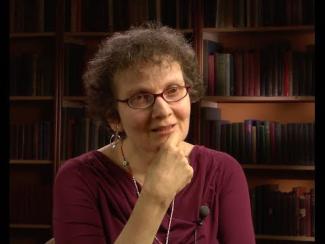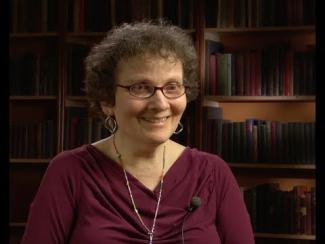The Yiddish Book Center's
Wexler Oral History Project
A growing collection of in-depth interviews with people of all ages and backgrounds, whose stories about the legacy and changing nature of Yiddish language and culture offer a rich and complex chronicle of Jewish identity.
Hanna Palmon's Oral History
Hanna Palmon, Israeli Yiddish teacher, was interviewed by Allie Brudney on April 26, 2012 at the Yiddish Book Center in Amherst, Massachusetts. Hanna was born in Haifa, Israel. Her mother, from Galicia, spent World War II in the Busk Ghetto before escaping into the surrounding forest. She and several friends survived a freezing cold winter in the forest, until a Ukrainian farmer hid them for two years in a small hideaway under his kitchen. After the war she emigrated to British Palestine and met and married Hanna's father, a cousin from the same Hermelin family who had lived in Palestine for twenty years. One of Hanna's distant relatives, David Moyshe Hermalin, began studying secular subjects, left his home in Moldova, moved to Bucharest, and eventually became a Yiddish translator, journalist and shund [literature deemed to be of inferior quality] novelist in New York. He also abridged and translated classic novels by Swift, Zola, Doyle and others into Yiddish. He advocated for assimilation into American culture. Growing up, Hanna heard many stories about Hasidic ancestors, but her home was a secular one. Her father had studied to be an engineer in Vienna but became a mechanic once he came to Palestine and then opened a restaurant in the theater district in Haifa. Late in life he had some regrets and began reading Talmud and Mishnah again. Her father translated Hebrew poetry into Yiddish but did not publish. Hanna recalls that her parents spoke Yiddish to each other but only Hebrew to their children. She felt that her household was unusual because her father had a more European style than her friends' fathers. Her mother was not formally religious but pious in her own way, and Hanna would attend Yom Kippur services in the Orthodox shul with her. In many ways Hanna's parents did not fit the Galician stereotype. Her father spent hours and hours reading the Torah in a secular way, seeking insight into moral dilemmas; he felt it was important that he reach his own conclusions in the end. Seeking to reconnect with her parents, who died when she was quite young, Hanna has been studying Yiddish in Boston at the Arbeter Ring and Brandeis University and now with a wonderful teacher in Boston. Hanna also attended the Yiddish program in Tel Aviv, surprising some Israeli friends who knew her to be a biomedical engineer before retirement. Although vestiges of the old attitudes remain, there is more acceptance of Yiddish in Israel than a generation or two ago. Hanna is expecting to find students who want to study the language with her when she returns. She reflects on gaining confidence teaching Yiddish and the advice her mentor gave her. She has taught students of diverse ages and professional backgrounds. She acknowledges that many students want to learn "the juicy parts," not grammar and other difficult aspects. Hanna feels that learning Yiddish broadened her identity, connecting her to her extended family, even those who died in the Holocaust. Although she grew up in a very homogeneous Israeli community, she always sensed the influence of Galicia and its multiculturalism. She wants her three daughters to know about their ancestors' rich cultural background, even if they are not interested in learning their language. She hopes that the so-called Yiddish revival is real and not just a passing trend. She advises those interested in learning Yiddish to take a summer course, read Yiddish poetry, work hard and enjoy!
This interview was conducted in English.
Hanna Palmon was born in Haifa, Israel in 1959.

